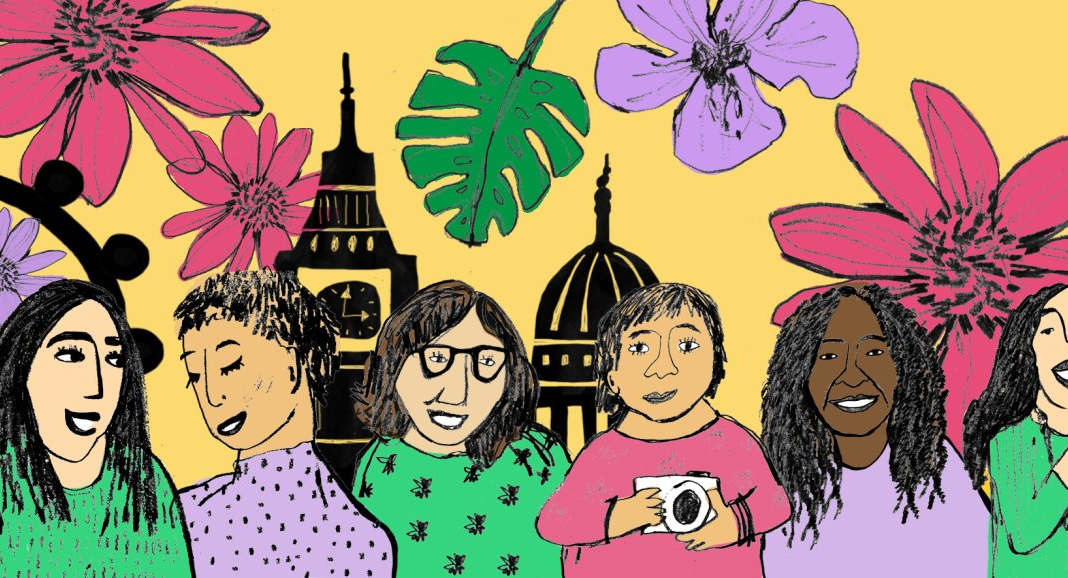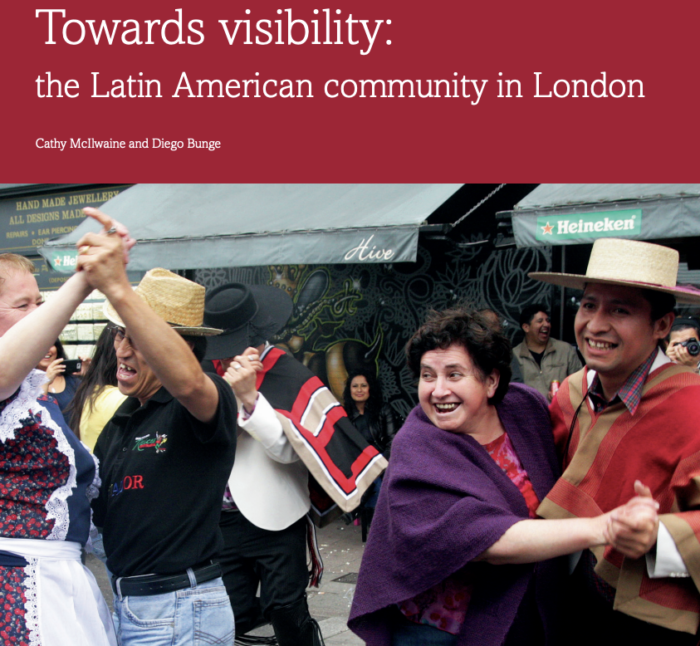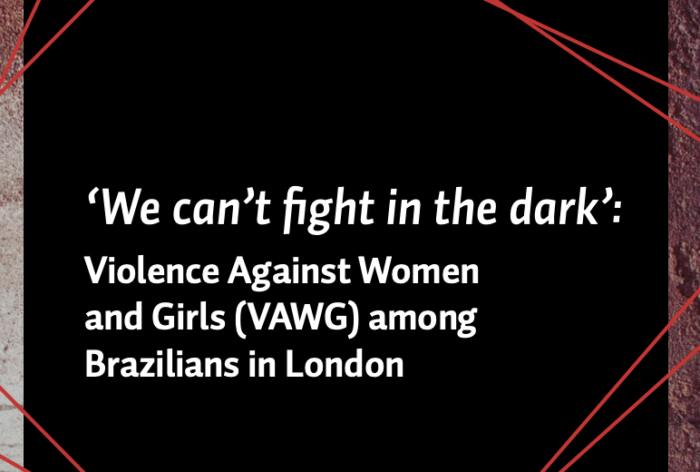‘Migrant women survivors are experts by experience and it is essential that they shape campaign demands and policy prescriptions.’
Migrant women’s organisations have found that women’s participation in research, consultation and advocacy activities leads to their empowerment. Expanding on this, advocacy worker and Policy and Communications coordinator at the Latin American Women’s Rights Services (LAWRS), Elizabeth Jiménez-Yáñez, and academic researcher at King’s College London, Cathy McIlwaine, together reflect on the importance of collaborative work bridging these sectors in order to effect change and empower women.
Too often academic researchers engage with migrant communities in superficial, extractive and unethical ways. Some harangue charities and other academic researchers in order to ‘get contacts’ and ‘source’ their research participants. Often the main goal is to find people to interview to inform the research for the benefit of the academic’s personal research agenda in isolation from that of the organisations they ‘work with’. These types of research practices have been questioned for decades, yet it is depressing how persistently common they remain among a large proportion of researchers.
Not only have the ethics of such engagements been questioned among academic researchers, but increasingly, organisations themselves have refused to work with researchers unless some basic ground rules are in place. These invariably revolve around identifying mutual benefit, profile- and issue-raising and the fundamental ethical principle of ‘do no harm’. The advantages of a more ethical and co-produced approach to conducting research with migrant communities are especially important when working on addressing violence against women.
In this piece, we – as an academic researcher and a coordinator of a campaign based in a migrant women’s right charity – reflect on the value and importance of long-term academic-civil society research collaborations that contribute to improving the lives of migrant women in London as well as producing higher quality research.
Our starting point is that this resulted from a long-term set of collaborations between Cathy McIlwaine and the Latin American Women’s Rights Service and the wider Latin American community since 2004. McIlwaine first began to work with the Colombian community in London through an early engagement with the Indo-American Refugee and Migrant Organisation (IRMO) and Carila Latin American Welfare Group, the latter where she served as the Chair of the Board. Following some small-scale studies that were published as easy-to-read reports in English and Spanish, McIlwaine began working with the Latin American Women’s Rights Service (LAWRS) in 2010 and produced two reports that remain, if now somewhat outdated, the primary data source on Latin Americans in London and the UK more widely (No Longer Invisible and Towards Visibility).
What are the benefits of a collaborative and co-produced approach?
This type of research is rooted in trust and partnership that develops over time to produce relevant data that addresses evidence gaps. In our case, these stretched beyond population estimates and socio-economic profiles to also include being able to reach ‘outlying’ communities and address neglected issues such as the intersection between insecure immigration status and violence against women and girls (VAWG).
From a research perspective, this has allowed for analysis of invisible issues that are often challenging for academics as lone or strictly university-based researchers. For academics increasingly being encouraged to ensure the societal impact of their research, these collaborations are invaluable. They provide legitimacy for the research and open doors to a policy world and decision-makers.
For organisations such as LAWRS who are a charity established ‘by and for’ Latin American women and who provide specialist services, this type of research can produce the evidence they need to inform their policy and campaigning work.
Charities are, rightly, focused on service provision and increasingly advocacy work. Yet this is difficult without a research base that speaks beyond the statistics of the census that invariably excludes or distorts the experiences of migrant communities such as Latin Americans who have yet to achieve a stand-alone ethnic categorisation by the Office of National Statistics (ONS).
The collaboration between Cathy McIlwaine and LAWRS provided the evidence that allowed them (and others) to apply for much-needed funds and to design their advocacy work. This occurred with the No Longer Invisible and Towards Visibility work (through the creation of the Coalition of Latin Americans in the UK – CLAUK – funded by the Trust for London who also funded the research).
This also led to more research specifically focused on violence against migrant women through our project and report We Can’t Fight in the Dark on violence against Brazilian migrant women in London and The Right to be Believed linked with the Step Up Migrant Women campaign.
Capturing the lived experiences of migrants through a multi-method grounded approach
Our experience in these research collaborations has shown that capturing the lived experiences of migrants, and especially migrant women, is fundamental to improving their lives through service provision and policy change.
While some of the invisibility work was necessarily based on analysis of existing statistical data sources in order to provide population estimates, the rest focused on revealing the diverse lives of Latin American migrants in London. We did this through conducting surveys and interviews run by community researchers (most of whom were Latin American) to examine the nature of their migration trajectories, immigration status, residence patterns, occupational histories and the barriers they faced in London.
This broad approach was followed in the research on gendered violence against Brazilian migrant women in collaboration with LAWRS, which included an online survey and interviews with individual migrants and representatives from organisations as well as focus groups.
Speaking about intimate details of experiences of violence in all its forms is clearly traumatic for many women, especially those with insecure immigration status. The collaboration with LAWRS meant that we were able to conduct the majority of the interviews and focus groups in a safe environment on LAWRS’s premises. In addition, we had a trained counsellor on hand throughout the process in case women became upset. The value of this project was revealed by Valentina’s comment which ended-up being the title of our report from the research: We Can’t Fight in the Dark.
‘So, when this reaches the public, when there is greater awareness, to say ‘look, this happens, it’s no use overlooking it, it’s no use closing your eyes, this is the reality of many homes’, then we can talk about the subject. Then we’ll be revealing the painful truth. Then everybody who’s going through this pain will feel ‘I have the right to say what’s happening to me, I’m not alone, I’m not the only victim’. Then that will encourage other women to speak up, to identify the problem, so we can fight it, because if we can’t identify it, we can’t fight it. You can’t fight in the dark if you don’t know who the enemy is, or what the enemy is’.
This project also laid the groundwork for the Right to be Believed research (co-authored with Lucila Granada and Illary Oblitas-Valenzuela), which focused on migrant women from 22 countries who had experienced gendered violence but who had explicitly experienced insecure immigration status.
These women were unlikely to speak to researchers and share their experiences unless there was trust and rapport. It was therefore only through our collaborative partnership with Step Up Migrant Women, LAWRS and the other member organisations of the campaign, that we were able to carry out this project. We did this through an online survey with 50 women using trusted networks to distribute it, mainly via the service organisations working with women who were able to explain why we were doing the research. However, we complemented this with interviews with women migrants (10) and representatives of organisations (11) together with 2 focus groups.
Types of violence experienced by migrant women survivors with insecure immigration status
The findings revealed the endemic nature of psychological, physical, sexual and financial violence experience by migrant women survivors, with psychological violence perpetrated by intimate partners within the home being the most common (experienced by 78%). Within this, the manipulation of immigration status by partners/husbands was the most prevalent and is also known as ‘status VAWG [Violence against Women and Girls]’. Yet, most of those interviewed and surveyed spoke of how they experienced multiple types of violence by multiple perpetrators over time; these were not isolated incidents.
As Katia, from Peru whose former partner was British noted:
‘My ex-partner had planned everything, inch by inch he used the system that he knew about and I didn’t. He is British and made me look as [if I were] the perpetrator. I was just defending myself from him’.
In a related form of intersecting status VAWG, economic abuse and institutional violence, Estela, from Mexico arrived in the UK on a domestic worker visa but was coerced into marrying her boyfriend when she got pregnant so as to stay in the country when her employers refused to renew her documents. She spoke about the financial abuse she suffered at the hands of her ex-husband:
‘He did not support me [economically], he was being paid housing benefit at that time and spent all the money … I had to pay all the rent and was frustrated with the fact that I [had] to pay all the expenses and have the baby.’
A key dimension of gendered violence against migrant women was how their insecure status is a risk factor for exacerbating the abuse. For instance, how immigration documents are withheld or lied about by partners as a tool of power and manipulation. As a service provider discussed:
‘The problem every woman who comes to us on a spouse visa has is that they have their name nowhere. The men are very clever, they don’t register her, they don’t put their name on a Tenancy Agreement, or a gas bill, or electricity bill, they don’t have bank statements. So, clearly they will not go near the police because they’d deport [them] … Even if she is “legal”, if she has a visa, they scare them about everything.’
When identifying the challenges they faced, two-thirds of migrant women said they felt unsupported due to their insecure immigration status, with another two-thirds stating that their perpetrator had threatened deportation if they reported the violence. In addition, more than half of the migrant women felt that the police would not believe them due to their immigration status. Their experiences were exacerbated by poverty, food insecurity and having to live in precarious accommodation.
Policy work centering the voices of migrant survivors: Step Up Migrant Women
Evidence produced through this type of work which centres the voices and experiences of migrant women survivors allows organisations like LAWRS and the Step Up Migrant Women campaign to develop a bottom-up approach to their policy work. Migrant women survivors are experts by experience and it is essential that they shape campaign demands and policy prescriptions. The Step Up Migrant Women campaign is led ‘by and for’ migrant women and as a result closely reflects their needs and demands.
LAWRS and Step Up Migrant Women have found that women’s participation in research, consultation and advocacy activities leads to their empowerment. These women feel like they have a stake in trying to change the system that is discriminating against them. Their involvement also means that their intersectional experiences and specific circumstances are taken into account. The nature of the barriers they face can be more clearly articulated by women survivors themselves.
In the words of Gil, an activist and a survivor who has been campaigning for Step Up Migrant Women since 2019 and who works for LAWRS as a support worker in a peer support group (Gil’s story is included in our podcast series Women Resisting Violence):
‘So, working with women today, I explain to them that they each have their own story, but they are not alone, that I have already been through the same. So, when I got this opportunity, it brought back the feeling of hope. One thing we always mention a lot with survivors is that when you’re in that situation, you feel like it will never end. But it will. And it is only going to end because we are gathering knowledge and learning how to deal with these hostile public services … it really is knowledge that opens doors’.
Impact of research on charities’ policy work
Step Up Migrant Women were a key player in lobbying for changes in the UK Domestic Abuse Act 2021. They campaigned to ensure that migrant women with insecure immigration status were included in support mechanisms, and that there was a “firewall” between them and the police and border control to allow them to report safely without fear of being deported and being able to access services. Our research for the campaign supported the case for including migrant women’s rights in the Act. We were able to include references to our research in this framework in order to give credence to the need to include migrant women.
The campaign won the support of a wide range of relevant decision-makers including securing cross-party support in the House of Lords as well as from the Domestic Abuse Commissioner, the Victims Commissioner and the London Victims Commissioner. However, among the three specific amendments demands, two were partially successful around data sharing in terms of victim’s personal data for immigration purposes (entailing a review and a code of practice). Despite these successes,However, the reality is that the Domestic Abuse Act 2021 does not respond to the need and urgency of protecting migrant women in the UK.
Conclusions: The right to be believed
In concluding, we would like to emphasise the importance of long-term collaborative engagements between charities and academic researchers especially when researching sensitive issues such as gender-based violence against women who belong to invisible communities and are discriminated against. Such engagements are able to reveal the realities of migrant women’s experiences.
We also reflect on another collaborative endeavour with Brazilian writer, director and performer, Gaël le Cornec, who created a verbatim audio piece, Believe, based on the testimonies that appear in the Step Up Migrant Women research. (This was part of an artist in residence programme developed by the Visual and Embodied Methodologies network at King’s College London and which started with a solo verbatim audio and movement piece).
By focusing on the experiences of three women survivors, Gaël created a sound narrative that highlighted the key dimensions of migrant women’s experiences of not being believed when they tried to seek help. With actors speaking the words of the women interviewed, they were able to remain anonymous and secure, but their experiences came alive. As such, it was possible to communicate the research results from the bottom-up approach favoured and valued by Step Up Migrant Women and LAWRS in their campaigning, advocacy and policy-making.
This is another example of creative collaboration within a long-term project, which demonstrates the importance of sustained engagements between charities and academic researchers, especially when researching sensitive issues such as gender-based violence against women who belong to invisible communities and are discriminated against. It is engagements like these that are able to reveal the realities of migrant women’s experiences and to influence evidence-led policy change.
Elizabeth Jiménez-Yáñez and Cathy McIlwaine.
Main image: MinA (Migrants in Action).
Listen to Episode 3 of the Women Resisting Violence podcast, which hears from women at LAWRS and MiNA about their work.






